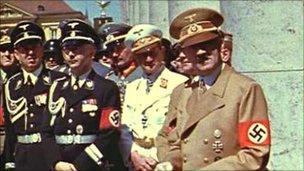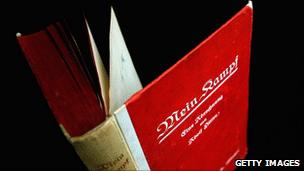The bizarre Nazi book craze
- Published

The UK's Nazi obsession is viewed with bemusement in some countries
Books about the Third Reich throng the British bestseller lists, but is it a matter of genuine historical interest or odd fetish, asks Clive Anderson.
The late Alan Coren famously published a collection of humorous pieces in book form, called Golfing for Cats. And he put a swastika on the front cover. He had noticed the most popular titles in Britain in those days were about cats, golf and Nazis.
That was in 1975. Thirty-six years on - and now more than 60 years since the end of World War II - Nazi books are going stronger than ever. A staggering 850 books about the Third Reich were published in 2010, up from 350 in the year 2000.
And they mostly still have a swastika on the front cover.
The phenomenal and continuing success of books about the Nazis includes fiction, non-fiction and science fiction.
They include the occult and the Nazis, Nazi magic, Nazi weaponry and Nazi doctors. There's the history of SS uniforms, SS staff cars, SS recruitment and propaganda.
You can read counter histories imagining Britain if the Nazis had won or post-war histories of the exploitation of Nazi scientific discoveries by America and the other Allied powers.
There is a first hand account of Himmler's masseur.
There are serious histories, adventures with the Panzer Division, and secrets of the Gestapo.
Collectible Spoons of the 3rd Reich by James Yannes is not an invention of Private Eye but a work, I suppose, of genuine scholarship. There's even a book about the Fuhrer's own collection of books - Hitler's Private Library.
So what is going on here? Are British book-buyers still looking for a warning from history or are some of them attracted by the ghastly glamour of history's most evil baddies?
Are some readers indulging some form of Nazi fetish? Some enthusiasts track down first editions of Hitler's Mein Kampf.
Is that necessary to understand the workings of a deranged mind, or something bordering on hero worship?
Life in Stalin's Russia, Mao's China, and Pol Pot's Cambodia have never generated such popular interest.
It is not unreasonable that in Britain people tell and re-tell the story of World War II. It is some story.
As Winston Churchill put it 1940, just before the Battle of Britain: "If the British Empire and its Commonwealth last for a thousand years, men will say 'this was their finest hour'."
The empire scarcely lasted another 30 years, but the hour continues to look finer and finer as time go by.

Books connected with Stalin, Pol Pot or Mao are far less popular
But does this require people to pore over every last detail of life in Nazi Germany?
To be fair, the odder looking sub-genres turn out not the works of madmen but works about the madder side of the madmen in charge of the Nazi regime.
The Nazis, it seems, did experiment with flying saucers, they did consult Tibetan monks, they did devise semi-religious ceremonies, they were interested in the lost city of Atlantis, space rockets and time travel.
So there's plenty of stuff to read, and write books about. But is our obsession with their obsessions altogether healthy?
The stand-up Henning Wehn, who styles himself Germany's comedy ambassador, recounts the fact that on his first visit to Britain, he turned on the television and it happened to be showing a documentary about the war.
What were the chances of that? He now knows there are always programmes on about the war. Some channels seem to play nothing else.
And there are always books about the Nazis in the bookshops.
Whether it is healthy or not for Britain's national psyche, it is certainly healthy for British publishers. The top 100 books on the Third Reich have generated sales of more than £12 million.
Times are hard in publishing so they are not going to look the Nazi cash cow in the mouth.